Second-hand tech booms as shoppers look for bargains
- Published

Anna Cargan has saved hundreds of pounds buying second-hand phones
"We're lucky, to be a family with two full-time working adults. Still, we're turning the thermostat down and putting extra jumpers on. We've switched to budget supermarkets to save money."
Anna Cargan, 35, lives with her husband and three young children in Barrow-in-Furness, Cumbria. She started saving for Christmas in January.
"We've really noticed how expensive things have got this year. We're having to think about what we're spending more than ever before."
The Cargans are not alone.
According to research, external by consultancy firm PWC, 86% of UK adults are concerned about affording the necessities of day-to-day life.
Meanwhile, 70% of UK adults are planning to spend less this festive period, with almost half planning to cut back on Christmas presents, according to a survey by Accenture, external.
One tactic Ms Cargan will use to save money this Christmas, is to buy second-hand tech.
"I've saved about £600 buying second-hand phones," she says. "I don't want the latest model - as long as it's functional, I'm happy."
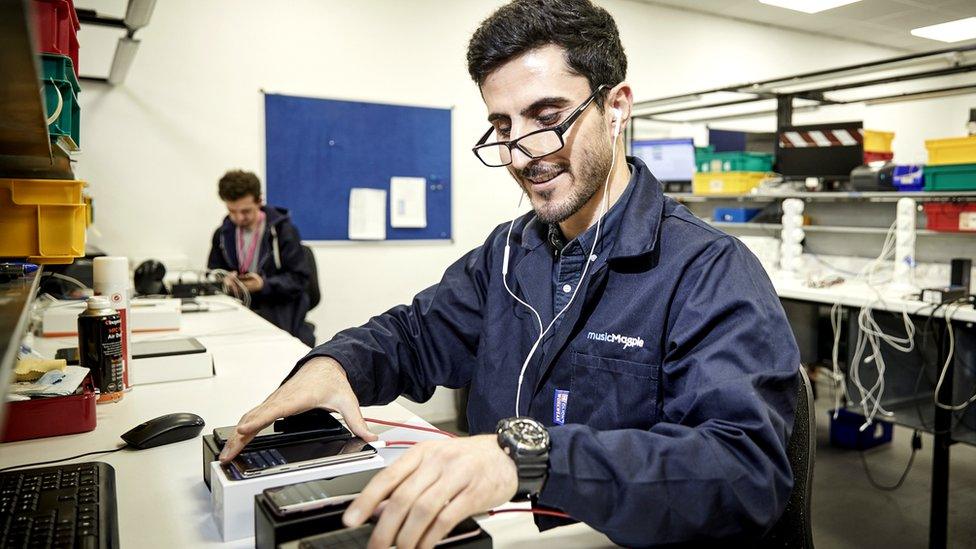
Music Magpie refurbishes 400,000 pieces of tech a year
She bought the phones from Music Magpie, which was founded in a garage in Stockport in 2007. Back then it sold second-hand CDs and DVDs.
Five years later, it expanded into electronics. Now Music Magpie has two workshops in the UK and one in the US, where it refurbishes all sorts of unwanted electronics.
Sam Vesey, Music Magpie's chief sustainability officer, suggests not only buying second-hand to save money, but also selling old tech too, to fund this year's present buying.
"There are estimates that people have about £600 of unused tech," says Ms Vesey. "That's about £16bn sitting in drawers nationwide."
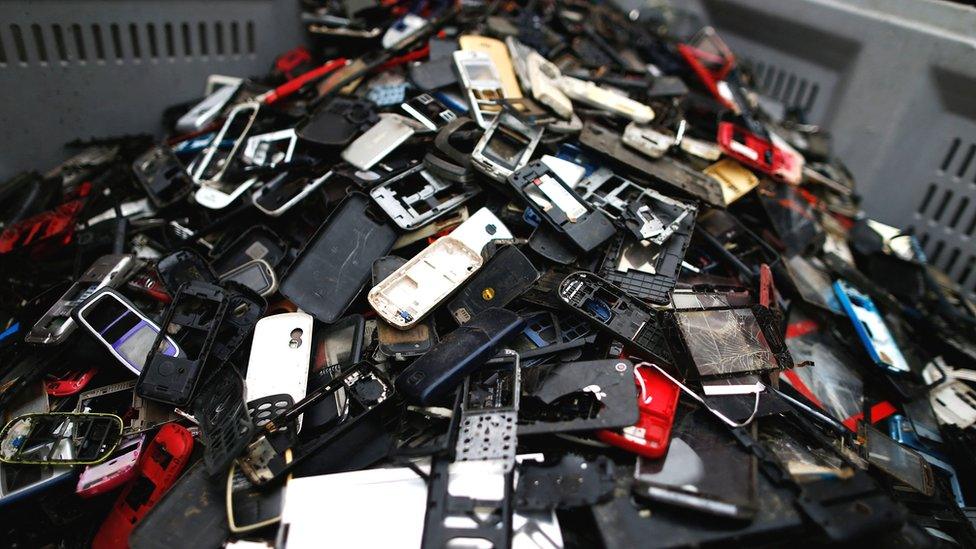
More than five billion phones will be discarded this year, according to WEEE forum
Now, with a growing number of companies offering pre-owned tech, buying second-hand, says Ms Vesey, no longer has the stigma it once had.
"We've seen an increase in demand for refurbished tech," she says. "In the same way that we've always been happy to have a second-hand house or a second-hand car, that's now passing through to our technology. People are quite happy to say 'mine's refurbed'."
According to the UN, external, e-waste, that's anything with a plug or a battery, is the world's fastest-growing domestic waste stream - fuelled by soaring consumption rates, short life cycles and limited options for repair.
Its report says that in 2019 only about 17% of e-waste was collected and recycled.
Meanwhile, the International Waste Electrical and Electronic Equipment, external (WEEE) Forum estimates that in 2022, more than 5.3 billion mobile phones alone will be discarded.
Gold, silver, copper, platinum and other high-value, recoverable materials, valued at about £47bn, are dumped or burned year after year, rather than being collected for treatment and reuse.


However, Ms Vesey believes it's a problem with a simple solution.
"The circular economy is at the heart of what we do - reducing e-waste while saving consumers money."
Music Magpie refurbishes about 400,000 tech items every year.
"If you want to get tech as a Christmas present, think about refurbished. It's a good thing. It's sustainable - and you will save money."
And from ice cream makers to headphones, there is a huge range of second-hand tech looking for a new home.
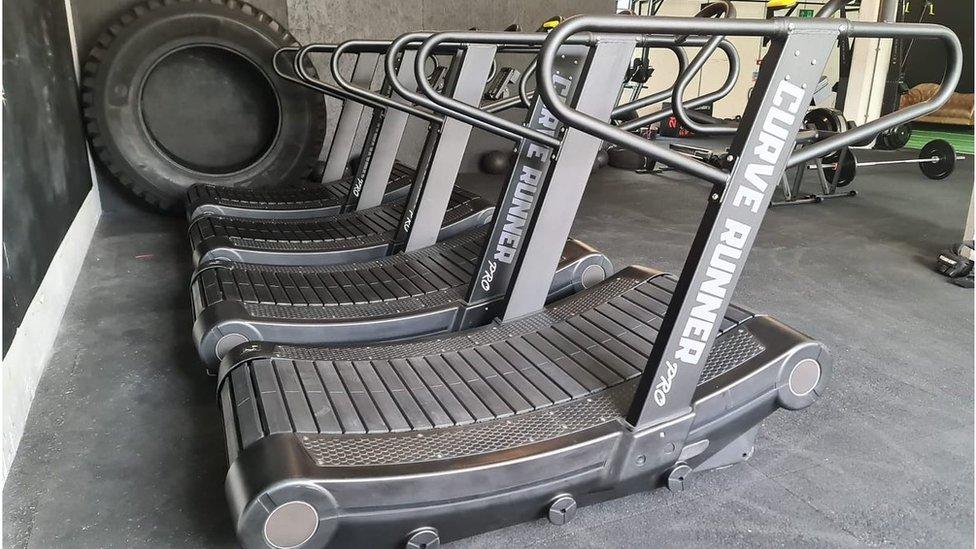
UK Gym Equipment buys and refurbishes anything you might find in a gym
In 2014, Matt Gale established UK Gym Equipment with the sole aim of refurbishing commercial exercise machines.
"At the time, most of the large gym chains and council facilities would order brand new equipment, keeping it for just four to five years before upgrading. A huge amount was scrapped."
UK Gym Equipment refurbishes and sells anything that you can find in a gym - treadmills, cross trainers, bikes, rowers and strength machines.
Ultimately, says Mr Gale, refurbished means you're getting more for your money.
"One of the biggest selling points is longevity," he says. "Refurbished commercial machines are often still in the market 15 to 20 years after manufacture. There's a consistent level of parts and service support that rarely exists with some of the cheaper high street machines."
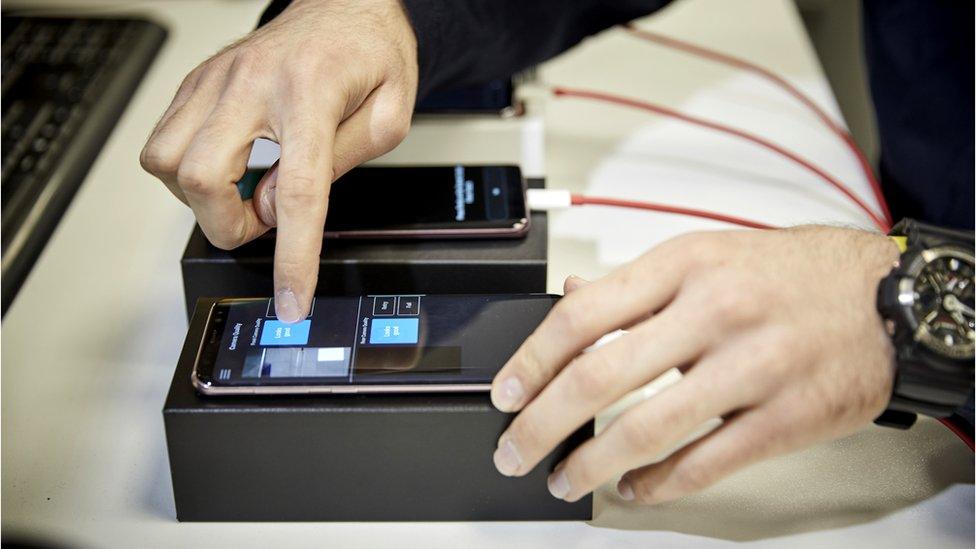
More than 300 components make up the average smartphone
Many electronic devices are not designed with the intention of keeping them in use for a long time.
"The linear economy has been the dominant way since the industrial revolution," says Joe Isles, circle of design programme lead at the Ellen MacArthur Foundation.
"Take phones, we have them on a contract for 18 months or two years. Then we're encouraged to move on to the next one."
Unbelievable efforts, he says, are made to source materials, to put those materials together, to design the products and turn them into a device - but often very little thought is put into what happens next.
"Most of the materials we use we lose - after just one relatively short usage period. The economic loss of relinquishing all that, letting it end up in landfill, is eye-watering."
And, it seems, the big tech companies are starting to realise this.
Vodafone has recently launched a refurbished phone range, offering a two-year warranty on every pay-monthly refurbished phone.
Research carried out for Vodafone by OnePoll found, of the 2,000 people surveyed, 73% would consider buying a refurbished phone to save money.
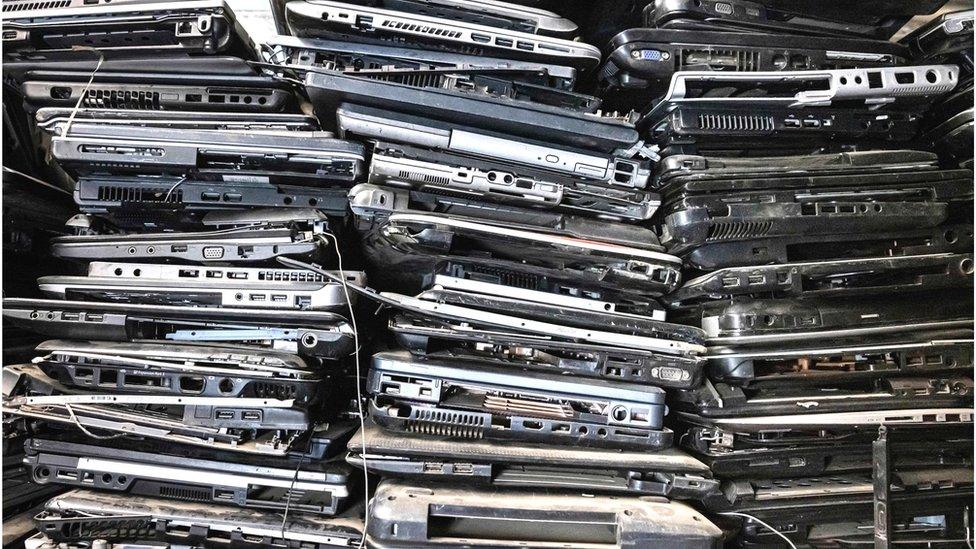
Electronic waste is the fastest growing source of waste, according to the UN
However, the research also highlighted peoples' concerns about buying second-hand tech, including worries about limited battery life, device longevity and data security - as well as a reluctance to use "someone else's" device.
To give customers peace of mind, Vodafone only offers handsets in "great" or "pristine" condition.
Every phone has a 32-point visual and diagnostic check to ensure components, such as the screen, battery and camera, are fully functional. Each device is deep cleaned and securely data wiped.
So, this year, while money is tight for so many families, perhaps buying and selling old tech is a way to help fund Christmas.
Back in Barrow-in-Furness, Anna Cargan says: "It's more important than ever in a cost-of-living and climate crisis to reuse things as much as we can.
"I'd love to see a world where we all see second-hand as first choice."